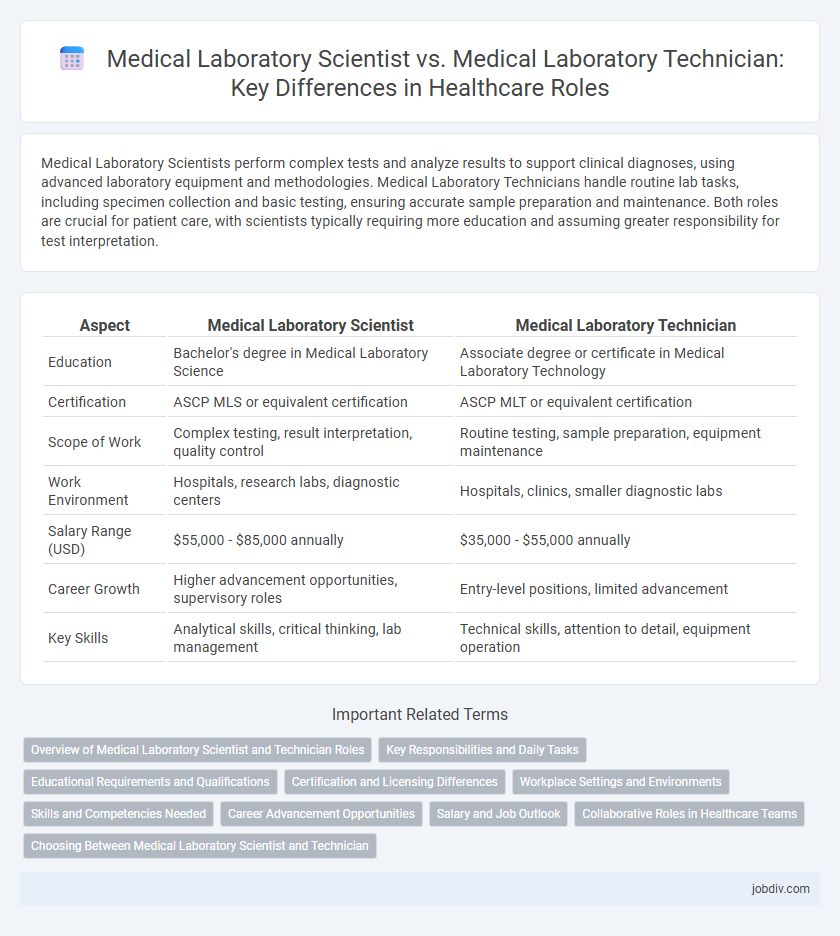Medical Laboratory Scientists perform complex tests and analyze results to support clinical diagnoses, using advanced laboratory equipment and methodologies. Medical Laboratory Technicians handle routine lab tasks, including specimen collection and basic testing, ensuring accurate sample preparation and maintenance. Both roles are crucial for patient care, with scientists typically requiring more education and assuming greater responsibility for test interpretation.
Table of Comparison
| Aspect | Medical Laboratory Scientist | Medical Laboratory Technician |
|---|---|---|
| Education | Bachelor's degree in Medical Laboratory Science | Associate degree or certificate in Medical Laboratory Technology |
| Certification | ASCP MLS or equivalent certification | ASCP MLT or equivalent certification |
| Scope of Work | Complex testing, result interpretation, quality control | Routine testing, sample preparation, equipment maintenance |
| Work Environment | Hospitals, research labs, diagnostic centers | Hospitals, clinics, smaller diagnostic labs |
| Salary Range (USD) | $55,000 - $85,000 annually | $35,000 - $55,000 annually |
| Career Growth | Higher advancement opportunities, supervisory roles | Entry-level positions, limited advancement |
| Key Skills | Analytical skills, critical thinking, lab management | Technical skills, attention to detail, equipment operation |
Overview of Medical Laboratory Scientist and Technician Roles
Medical Laboratory Scientists perform complex diagnostic tests, analyze samples, and interpret results to assist in patient diagnosis and treatment, requiring a bachelor's degree and extensive training. Medical Laboratory Technicians conduct routine laboratory tests, prepare samples, and maintain equipment under supervision, typically holding an associate degree or certification. Both roles are crucial in clinical laboratories, with scientists focusing on advanced analysis and technicians supporting daily laboratory operations.
Key Responsibilities and Daily Tasks
Medical Laboratory Scientists perform complex tests, analyze results, and ensure accuracy for diagnosing diseases, often supervising laboratory technicians. Medical Laboratory Technicians conduct routine testing, prepare samples, operate instruments, and maintain lab equipment under the supervision of scientists. Both roles require strict adherence to safety protocols and precise documentation to support patient care.
Educational Requirements and Qualifications
Medical Laboratory Scientists typically require a bachelor's degree in medical laboratory science or a related field, along with certification such as the ASCP MLS credential, ensuring advanced expertise in laboratory testing and analysis. Medical Laboratory Technicians usually need an associate degree or certification from an accredited program, often earning credentials like the ASCP MLT, which qualify them for conducting routine laboratory procedures under supervision. The distinction in educational requirements reflects the differing responsibilities and technical skills expected of each role within clinical laboratory settings.
Certification and Licensing Differences
Medical Laboratory Scientists typically require a bachelor's degree and must obtain certification from agencies like the ASCP or AMT, while Medical Laboratory Technicians often need an associate degree with certification that varies by state. Licensing requirements for Medical Laboratory Scientists are more stringent, often mandated by state health departments, whereas licensing for Technicians is less uniform and sometimes not required. Certification for both roles ensures proficiency and adherence to clinical laboratory standards, but Medical Laboratory Scientists generally face higher licensure barriers due to their advanced responsibilities.
Workplace Settings and Environments
Medical Laboratory Scientists typically work in hospital laboratories, research facilities, and public health institutions performing complex diagnostic tests with advanced instrumentation, while Medical Laboratory Technicians are commonly employed in smaller clinics, physician offices, and routine testing labs handling more standardized procedures. The workplace environment for scientists demands higher analytical skills and often involves supervisory roles, whereas technicians focus on specimen preparation and basic test execution under supervision. Both roles require adherence to strict safety protocols and quality control measures to ensure accurate patient diagnostics.
Skills and Competencies Needed
Medical Laboratory Scientists require advanced skills in complex diagnostic testing, data analysis, and laboratory management, with competencies in microbiology, hematology, and molecular biology. Medical Laboratory Technicians focus on routine specimen processing, basic laboratory procedures, and equipment maintenance, requiring strong attention to detail and proficiency in laboratory safety protocols. Both roles demand thorough knowledge of laboratory information systems, quality control standards, and effective communication skills for accurate reporting.
Career Advancement Opportunities
Medical Laboratory Scientists typically have more advanced responsibilities and require a bachelor's degree, offering greater career advancement opportunities in specialized fields such as molecular diagnostics and clinical research. Medical Laboratory Technicians usually hold an associate degree with limited scope, often moving into supervisory or technical support roles. Pursuing certification and continuing education accelerates career growth for both professionals but is more impactful for scientists aiming for leadership or management positions.
Salary and Job Outlook
Medical Laboratory Scientists typically earn a higher median salary, around $57,000 annually, compared to Medical Laboratory Technicians who average about $45,000 per year, reflecting their advanced education and responsibilities. Job outlook for both careers is strong, with projected growth rates of 7% for Scientists and 11% for Technicians through 2031, driven by expanding healthcare needs. Employment opportunities are abundant in hospitals, diagnostic laboratories, and research facilities, emphasizing the critical role both play in patient care and medical diagnostics.
Collaborative Roles in Healthcare Teams
Medical Laboratory Scientists and Medical Laboratory Technicians both play crucial roles in diagnostic testing but differ in education and responsibilities within healthcare teams. Medical Laboratory Scientists analyze complex data and oversee laboratory operations, ensuring accurate results that guide patient care decisions. Medical Laboratory Technicians perform routine tests and prepare specimens, collaborating with scientists and clinicians to support timely and effective diagnosis and treatment.
Choosing Between Medical Laboratory Scientist and Technician
Choosing between a Medical Laboratory Scientist (MLS) and a Medical Laboratory Technician (MLT) depends on education level, job responsibilities, and career goals. MLS professionals typically hold a bachelor's degree and perform complex tests, data analysis, and research, while MLTs usually have an associate degree and focus on routine laboratory tasks and sample processing. Understanding certification requirements from organizations such as the American Society for Clinical Pathology (ASCP) helps clarify the scope of practice and advancement opportunities in clinical laboratory settings.
Medical Laboratory Scientist vs Medical Laboratory Technician Infographic

 jobdiv.com
jobdiv.com